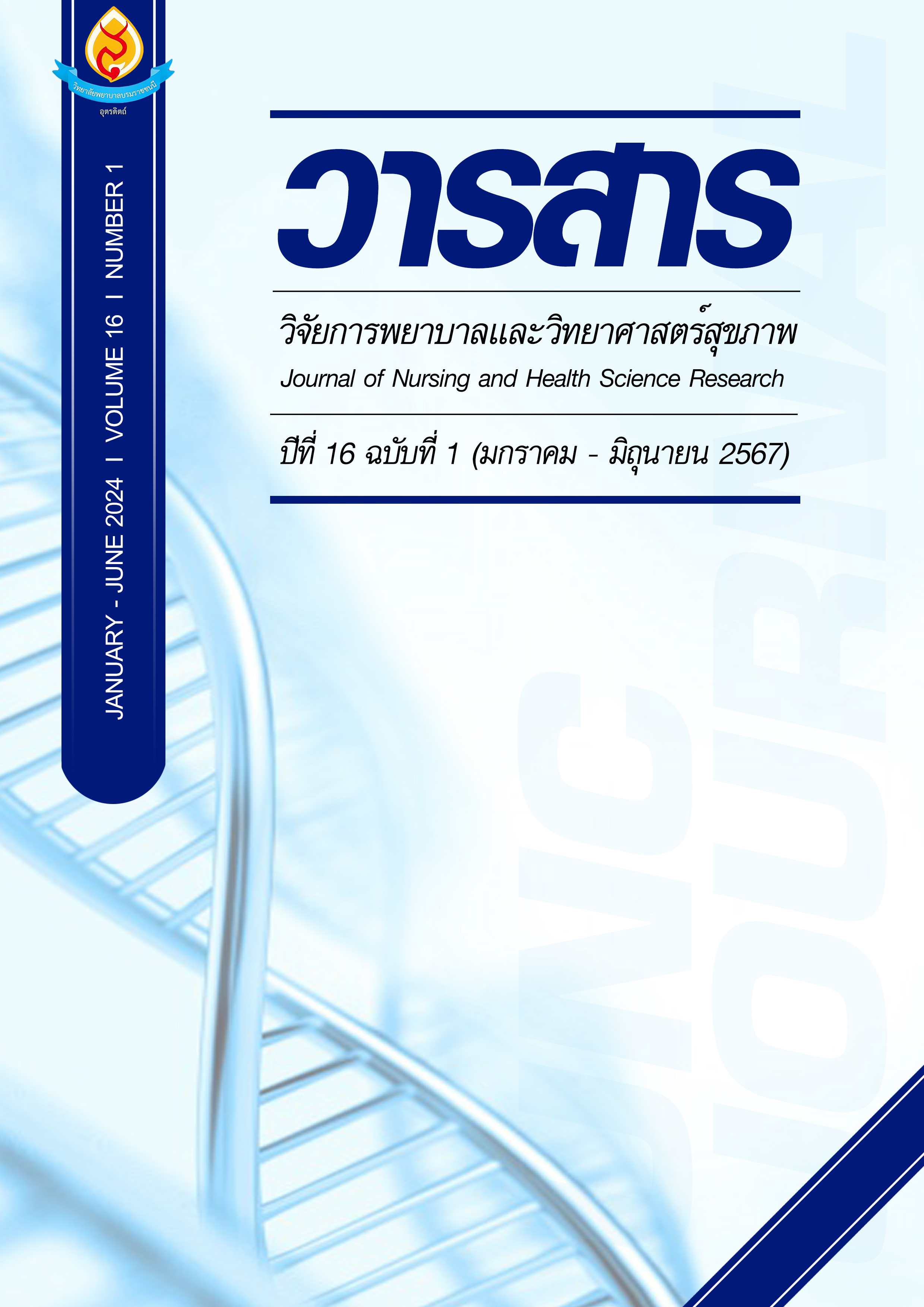ผลของโปรแกรมสนับสนุนการจัดการตนเองตามแบบ 5 เอ ต่อความรู้ พฤติกรรมการจัดการตนเองด้านการออกกำลังกายและการรับประทานอาหาร และระดับไขมันในเลือดของพนักงานที่มีภาวะน้ำหนักเกิน ในโรงงานอุตสาหกรรมแห่งหนึ่งในจังหวัดสมุทรปราการ
Main Article Content
บทคัดย่อ
การศึกษากึ่งทดลองครั้งนี้มีวัตถุประสงค์เพื่อศึกษาผลของโปรแกรมสนับสนุนการจัดการตนเองตามแบบ 5 เอ ต่อความรู้ พฤติกรรมการออกกำลังกายและการรับประทานอาหาร และระดับไขมันในเลือดของพนักงานที่มีภาวะน้ำหนักเกิน ในโรงงานอุตสาหกรรมแห่งหนึ่ง ในจังหวัดสมุทรปราการ กลุ่มตัวอย่างในการศึกษาเป็นพนักงานที่มีภาวะน้ำหนักเกินจำนวน 70 คน แบ่งเป็นกลุ่มทดลองและกลุ่มควบคุมกลุ่มละ 35 คน เครื่องมือที่ใช้ในการศึกษาประกอบด้วยโปรแกรมสนับสนุนการจัดการตนเองตามแบบ 5 เอ และชุดแบบสอบถาม วิเคราะห์ข้อมูลด้วยสถิติเชิงพรรณนา เปรียบเทียบค่าเฉลี่ยและการวิเคราะห์ความแปรปรวนแบบวัดซ้ำ
ผลการศึกษาพบว่าหลังการทดลอง 16 สัปดาห์ และ 20 สัปดาห์ กลุ่มทดลองมีค่าเฉลี่ยความรู้เรื่องภาวะน้ำหนักเกิน พฤติกรรมการออกกำลังกายและการรับประทานอาหารสูงกว่าก่อนการทดลองและสูงกว่ากลุ่มควบคุมอย่างมีนัยสำคัญทางสถิติที่ระดับ .05 สำหรับค่าเฉลี่ยระดับไขมันในเลือดในกลุ่มทดลองพบว่า หลังการทดลอง 20 สัปดาห์ มีเพียงค่าเฉลี่ยไตรกลีเซอไรด์ และไขมัน LDL ลดลงกว่าก่อนการทดลองอย่างมีนัยสำคัญทางสถิติที่ระดับ .05 เมื่อเปรียบเทียบกับกลุ่มควบคุมพบว่าคอเลสเตอรอลรวม ไตรกลีเซอไรด์ ไขมัน LDL และ ไขมัน HDL ไม่แตกต่างกัน
จากผลการศึกษาแสดงให้เห็นว่าโปรแกรมสนับสนุนการจัดการตนเองตามแบบ 5 เอ สามารถเพิ่มระดับความรู้ พฤติกรรมการออกกำลังกายและการรับประทานอาหาร ลดระดับไตรกลีเซอไรด์และไขมัน LDL ได้ ดังนั้นผู้บริหารสามารถนำไปใช้เป็นแนวทางในการกำหนดนโยบายด้านสุขภาพ และผู้ให้บริการสุขภาพสามารถนำไปใช้เป็นแนวทางในการจัดกิจกรรมเพื่อปรับเปลี่ยนพฤติกรรมสุขภาพของพนักงานที่มีภาวะน้ำหนักเกินในสถานประกอบการได้
Article Details

อนุญาตภายใต้เงื่อนไข Creative Commons Attribution-NonCommercial-NoDerivatives 4.0 International License.
บทความหรือข้อคิดเห็นใดใดที่ปรากฏในวารสารวิจัยการพยาบาลและวิทยาศาสตร์สุขภาพ เป็นวรรณกรรมของผู้เขียน ซึ่งบรรณาธิการหรือสมาคมศิษย์เก่า ไม่จำเป็นต้องเห็นด้วย และบทความที่ได้รับการตีพิมพ์เผยแพร่ถือเป็นลิขสิทธิ์ของวารสารวิจัยการพยาบาลและวิทยาศาสตร์สุขภาพ
เอกสารอ้างอิง
Antunes, L. C., Levandovski, R., Dantas, G., Caumo, W. & Hidalgo, M. P. (2010). Obesity and shift work: chronobiological aspects. Nutrition research reviews, 23(1), 155–168. doi.org/10.1017/S0954422410000016.
Ariana, C., Kerry, Q. & Thomas, W., (2021). Dietary interventions for obesity, clinical and mechanistic findings. The Journal of Clinical Investigation, 131(1), e140065 doi: 10.1172/JCI140065.
Bunkongrat,T. & Sitilertpisan, P (2023). The effectiveness of using application KAOTAJAI for promoting physical activity in employees of a company in Lamphun province. Lanna Journal of Health Promotion & Environmental Health, 14, 1-17. (in Thai).
Chantawat, K., Toonsir, C & Rattanagreethakul, S. (2016). Effects of self-regulation program on weight loss behavior and bodyweight among overweight female health care personnel. The Journal of Faculty of Nursing Burapha University, 24(3), 83-93. (in Thai).
Damon, S., Joshua, M., Conrad, E., Erica, C., Madison, N. & Neil, J. (2018). The effects of exercise and physical activity on weight loss and maintenance. Progress in Cardiovascular Diseases, 61(2), 206-213. doi: 10.1016/j.pcad.2018.07.014
Department of Industrial Works. (2023). Cumulative statistics of establishments operated reg- istration at Ministry of Industry from Factory Act B.E. 1992 by Province in 2023. Retrieved (2024, March 3). from https://www.diw.go.th/webdiw/static-fac/ (in Thai).
Division of Non-Communicable Diseases. (2023). The department of disease control encourages Thai people to pay attention to their health and change their perspective to reduce obesity. Retrieved (2024, March 3). from
https://ddc.moph.go.th/brc/news.php?news=32470&deptcode=brc&news_views=192 (in Thai).
Duangsai, S. & Chinnawong, T. (2021). Effect of 5 A’s self-management support program on self-management behaviors in patients with uncontrolled hypertension. Songklanagarind Journal of Nursing, 41(4), 74-85. (in Thai).
Glasgow, R. E., Emont, S. & Miller, D. C. (2006). Assessing delivery of the five ‘As’ for patient- centered counseling. Health Promotion International, 21(3), 245-255.
Hulsegge, G. & et al. (2016). Shift workers have a similar diet quality but higher energy intake than day workers. Scandinavian Journal of Work, Environment & Health, 42(6), 459– 468.
Jantima, P. & Sritaratikul, S. (2017). The effect of promoting self-management for health behavior modification of metabolic syndrome risk group. Nursing Journal, 44(2), 162-171. (in Thai).
Khovidhunkit, W. & Srimada, V. (1997). Endocrinology and metabolic disorders. Bangkok: Chulalongkorn University. (in Thai).
O’Brien, V.M. et al. (2020). Overweight and obesity in shift workers: associated dietary and lifestyle factors. The European Journal of Public Health, 30(3), 532–537.
Olateju, I.V. et al. (2021). Role of behavioral interventions in the management of obesity. Cureus, 13(9), e18080.
Ozlem, C. & Bülent, Y. (2021). Obesity and physical exercise, Minerva Endocrinol, 46(2), 131-144. doi.org/10.23736/S2724-6507.20.03361-1.
Pamungkas, R.A., Chinnawong, T. & Kritpracha, C. (2015). The effect of dietary and exercise self-management support program on dietary behavior exercise behavior and clinical outcomes in Muslim patients with poorly controlled type 2 DM in a community setting in Indonesia. Nurse Media Journal of Nursing, 5(1), 1 – 14.
Phuangchumpa, S., Piboon, K., Jaidee, W. & Chaiklongkit, K. (2020). The effects of self management support program on knowledge, exercise Behavior, number of steps, and Hemoglobin A1C among type 2 diabetes patients. Royal Thai Navy Medical Journal, 4(47), 275-300. (in Thai).
Prasertjit, P., Limpaseni, W. & Sumanasrethakul, C. (2020). Lifestyle factors associated with obesity in urban workers: a case study of faculty of medicine personnel, Vajira Hospital.Vajira Medical Journal. Journal of Urban Medicine, 64(1), 71-84. (in Thai).
Polit, D.E., & Beck, C.T. (2004). Nursing Research: Principles and Methods. 7th Edition. Philadelphia: Lippincott Williams & Young.
Salemonsen, E., Førland, G., Hansen, B.S. & Holm, A. L. (2020). Beneficial self-management support and user involvement in healthy life centres—a qualitative interview study in persons afflicted by overweight or obesity. Health Expectations, 23, 1376–1386.
Samutprakarn Provincial Labour Office. (2023). Labour situation of Samutprakarn Province 2023 (January- December 2023). Retrieved (2024, March 3). from
https://samutprakan.mol.go.th/news_group/labour_situation (in Thai).
Shrestha, N., Pedisic, Z., Neil-Sztramko, S., Kukkonen-Harjula, K.T. & Hermans, V. (2016). The impact of obesity in the workplace: a review of contributing factors, consequences, and potential solutions. Current Obesity Reports, 5, 344–360.
Suranartwatchawong, K. S., Pongsangpan, P. & Piboon, K. (2020). Effectiveness of a self- management support program for obesity among staff at the Faculty of Medicine at
Burapha University. Burapha Journal of Medicine, 7(2), 23-38. (in Thai).
Suwankruhasn, N., Pothiban, L., Panuthai, S. & Boonchuang, P. (2013). Effects of a self- management support program for Thai people diagnosed with metabolic syndrome. Pacific Rim International Journal of Nursing Research, 17(4), 371-383.
Thipkratok, S. & Phatisena, T. (2020). Effects of self-management program for health behavior modification, body mass index, and waist circumference among village health volunteers with abdominal obesity. Regional Health Promotion Center 9, 14(34), 210-223. (in Thai).
Tongvichean, T., Aungsuroch, Y. & Preechawong, S. (2019). Effect of self-management exercise program on physical fitness among people with prehypertension and obesity: a quasi- experiment study. Pacific Rim International Journal of Nursing Research, 23(1), 6-17.
Welzel, F.D. et al. (2021). Using a brief web-based 5A intervention to improve weight management in primary care: results of a cluster-randomized controlled trial.
BMC Family Practice, 22, 61, doi.org/10.1186/s12875-021-01404-0.
World Health Organization. (2020). WHO guidelines on physical activity and sedentary behavior. Retrieved (2024, March 3). from https://www.who.int/publications/i/item/9789240015128.
World Obesity Federation. (2023). World Obesity Atlas 2023. Retrieved (2024, April 1). from


